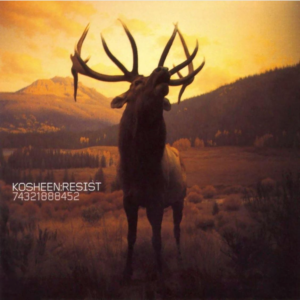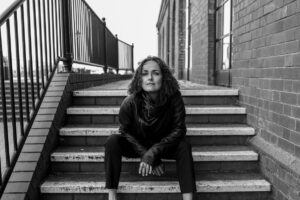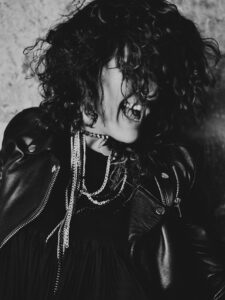 Sian Evans is best known as the front person / songwriter for electronic dance collective KOSHEEN.
Sian Evans is best known as the front person / songwriter for electronic dance collective KOSHEEN.
Where many early 2000-era dance acts were lucky if they hit on a one-track formula or sound, KOSHEEN were comfortably able to straddle several genres and have multiple hits from their debut album ‘Resist’, most notably ‘Hide U’ and ‘Catch’ which was subsequently covered by German Trance duo BLANK & JONES.
Despite KOSHEEN going their separate ways in 2016, she has perpetuated a hugely successful career as a writer / solo artist scoring two UK No1 singles with DJ FRESH; one as an artist, the other as a co-writer.
Sian kindly spoke about her route into the music industry, the formation of KOSHEEN and collaborative work.
 How important was your family’s musical influence on you, especially that of your mother and grandfather?
How important was your family’s musical influence on you, especially that of your mother and grandfather?
I was a member of a very big musical Welsh family. My grandfather’s house was the centre of our world and we would all be there, birthdays, Christmas and any other excuse for a gathering. It would inevitably turn into a musical occasion. Most of my cousins and relatives could play the piano or the violin.
I was very difficult to teach, so I was taught to sing by my grandfather who was a conductor for the male voice choir, a musical arranger for choral music in the community. It all sounds very grand but actually the working class of Wales was and historically has been very musical culture for which I am extremely grateful.
Music was normalized in my childhood and put within my grasp, which is something that I try to do with my workshops and with my youth-work and my outreach work with young people and make music accessible to them.
In 1991, you gave birth to your son Yves at the peak of Rave culture. You ended up raising him in a teepee whilst formulating songs which would eventually form the first KOSHEEN album. What kind of an experience was this and what drove you to write the songs that you eventually came up with?
When my son was born, I found myself with one foot in the party scene and rave culture that was exploding across the country on so many levels, and the other foot in young parenting, trying to balance those two worlds, was impossible!
I moved to a community where there were older parents who supported me and helped me parent. It was nestled on the side of a mountain in a beautiful place. The children ran wild and free having the best early childhood I could offer my son as I had no money. The forest was our playground and classroom. We all took responsibility for the kids that lived with us. And we even built a traveller school there with the help of the traveller’s school charity. They were happy, mucky, kids. And happy kids make for happy parents!
This support and freedom allowed me to be creative and to have enough time to sit down and write the songs that had been floating around in my head for many years. To be in a nature, you know, surrounded by nature was just perfect, it was inspirational.
 You eventually hooked up with Darren Beale and Mark Davies to form KOSHEEN, how was the transition from writing songs solo to being in more of a band dynamic?
You eventually hooked up with Darren Beale and Mark Davies to form KOSHEEN, how was the transition from writing songs solo to being in more of a band dynamic?
Before I had my son, and when I was growing up in Cardiff, I was in and out of bands, backing singing and eventually coming forward and singing front main vocal. I worked in a cabaret band as well, I was broke, this was the best way that I could make some money to be able to support myself and Yves.
I could see electronic music was really happening in Bristol (where my son’s father lived) so we decamped and moved into the City. I knew that my songs would translate to this genre so it was just a matter of finding the right producers who would share my vision.
I met Markee (Mark Davies) and went to try out in the studio. He loved what I brought to the table, introduced me to Darren and we began making an album.
KOSHEEN was self-managed, what were the pros and cons of that arrangement?
I was very trusting and I believed that the guys knew what was best for us. Darren and Mark had run their own labels in the past and I believed they / we could run KOSHEEN. However, management do a very specific role. They are the buffer zone between you and the label, the buffer zone between you and the agency. And we didn’t have that buffer so the majority of our time on the road was gruelling and really hard work physically because there was nobody organising a humane way for us to travel.
So in hindsight, I would say that management would have been beneficial to us especially as the band took off at the rate that we did. One minute we’re writing songs on the backs of bus tickets, and next we’re on a private jet, so it was very fast and very difficult to manage, personally and professionally.
How was the period when ‘Hide U’ took off and how much did your life change at this point?
‘Hide U’ was an absolute surprise to everybody, it was so simple and so beautiful. But I think that people really wanted to hear a voice in drum-n-bass, a full song maybe, and this is what ‘Hide U’ did. We went from poor as church mice to being able to buy my own house. That’s massive for somebody with a history of homelessness and an alternative lifestyle. For a single mum, in the inner city to suddenly be able to say to my son: “Yves, we can buy a house!” It was an incredible feeling.
The album cover design and sleeves for the singles circa ‘Resist’ still look stunning, how much involvement did you have with the artwork surrounding the band and what do you think of them now?
I’m extremely proud of the artwork for ‘Resist’. We wanted something iconic, something strong. We didn’t necessarily want our faces on the covers, we wanted to represent as a sound rather than as individual people. And I think that artwork for ‘Resist’ did that amazingly well and still stands the test of time. We were with BMG at the time and they helped us with designers who listened to us, so we were very lucky that we were represented that way. And yeah, to this day, I love that cover.
At the heart of ‘Catch’ is a drum pattern which sounds suspiciously like it’s fleeced from ‘Numbers’ by KRAFTWERK; as the German electronic masters are notoriously ‘legal’ when it comes to such things, what was the gestation of this track?
I’m not aware of that being the same, but then you can’t really play anything you haven’t heard, so we’re all as you say fleecing beats and pieces from all the music that we’ve been influenced by! And I know that Mark is a KRAFTWERK fan so the chances are there are some bits and bobs that will be reminiscing of that genre of music, I mean KRAFTWERK were a movement really rather than a genre, and they just blazed a trail that all electronic music is kind of influenced by.
For its time, ‘Resist’ was a very eclectic album, were you concerned that dance-heads who’d only been previously exposed to club oriented tracks such as ‘Hide U’ might not “get it”?
 I never doubted ‘Resist’ in any way. Darren and Mark, Mark not so much.
I never doubted ‘Resist’ in any way. Darren and Mark, Mark not so much.
Darren was much more of a tech head than any of us. I mean, he was like “Wow, this is weird!” and a few DJ friends of ours were like “Who the f*ck is gonna play this?”
But personally I knew that it was right, and I knew my songs were taking on a different shape, but the songs were brilliant and it was standing out, they were in a good place. And I knew that they would attract attention and they certainly did.
The promo video to ‘Hungry’ is interesting, did you personally do any filming in the Natural History Museum or were you added in via CGI?
I don’t think there was much CGI going on. When we did that video we spent two nights in the Natural History Museum. It is me jumping through that glass, it is me being chased by wolves, although, there weren’t as many of them in the museum as there are on the video. Yeah, I loved it, I really enjoyed it, I wanted to be an actress when I was growing up. I wanted to be on the stage. I got to flex that part of my character, my personality and yeah, I loved it!
In 2001 you played to 20,000 people in Serbia, this must have been quite an experience? How did this come about and what were your recollections of this show in an area that had only recently seen such huge turmoil?
Playing ‘Exit’ in Serbia was such a massive highlight for me and for us, I mean we were unaware of selling any records in Serbia, but when we played ‘Exit’ there were 20 thousand people there and they knew the songs, so it was just incredible. There is something incredible about the young people there, they’d been through so much in their short lifetimes and seen so much suffering. Yet they were taking their lives by the horns and by their hands, it was a euphoric experience. They’ve invited us back to play next year which will be the 20th Anniversary of the festival.
 The follow-up ‘Kokopelli’ was a far less electronic album, how much pressure was there at the time to deliver a ‘Resist – Part 2’ and what made you release such a different sounding set of songs?
The follow-up ‘Kokopelli’ was a far less electronic album, how much pressure was there at the time to deliver a ‘Resist – Part 2’ and what made you release such a different sounding set of songs?
After the success of ‘Resist’, KOSHEEN went from bedroom recording to touring around the world. I had more songs in the bank, which with the platform of ‘Resist’ seemed ready to record and release.
We’d created an environment, we‘d created a sound and a space where we could get away with anything. And so we did, I became more confident as a writer and we started to really become ourselves in ‘Kokopelli’.
ELECTRICITYCLUB.CO.UK has often felt a bit cheated when going to see an electronic band ‘live’ when it’s sometimes a person sheepishly prodding MIDI controllers behind a laptop. With KOSHEEN and your current set-up (which features several live musicians), what’s your viewpoint on the best ways of performing electronic music to an audience?
You do the best you can, with whatever is at your fingertips. We’ve got great material, it’s melodic, it lends itself to live musicians. I have amazing musicians. We’ve got great producers to update the tracks, to make them fit and make them more exciting for audiences today.
I’m a performer, I was born a performer, I think. I’m in my element when I’m on stage in front of people, not because it’s a “Look at me!” scenario, but because I love that sense of excitement and community.
 It really feels like the songs come to life when there is an audience and the band with me.
It really feels like the songs come to life when there is an audience and the band with me.
And if I’m gonna go to a gig I want to see a performance, I want to feel the energy, the passion of the musicians and the writers and try to get a window into where they found their inspiration and relate to my own interpretation. And then I feel as if I’ve got my money’s worth.
The two collaborations with DJ FRESH, ‘Louder’ and your co-write with him for RITA ORA ’Hot Right Now’ brilliantly helped propel you back into the public eye with both tracks becoming UK No1 singles. This must have been an incredibly exciting and invigorating musical period for you, how did it feel to have a massive second bite of the musical cherry?
I’ve always loved to collaborate. To me collaboration is a living art and it excites me to take something that I have and put it with somebody else’s property and to mix that together and create something brand new that neither of us could’ve done single-handedly, is an exceptional feeling. So writing these songs with Dan Stein (DJ FRESH) was in itself a fabulous experience.
The success of it was amazing! It was during a hiatus that KOSHEEN were having due to personal issues between us in the band. The guys weren’t very supportive of me collaborating with other artists, but it was brilliant for me and for my confidence. And yes, it put me into position where other people were asking me to collaborate and it was the continuum of my creative process.
After returning to a more electronic aesthetic with ‘Independence’ and ‘Solitude’, KOSHEEN eventually parted ways in 2016… looking back, what was the musical highlight of being part of KOSHEEN?
The highlight of being a part of KOSHEEN has been watching KOSHEEN go from someone’s bedroom to enormous stages and reaching so many people and having such a great time with it. There have been some very, very difficult times. The relationship between Darren and Mark and myself broke down irreparably due to pressures and family situations and the lack of management.
I mean, I would have never created such an incredible sound and such an amazing life, if it weren’t for the three of us being together, and that collaboration will always be incredibly precious to me. But there is more for me to do and there is more, for me to achieve. I feel as if it is a responsibility to continue, to take these great tracks out on the road again, to perform them and share the love.
You are touring at the moment with original KOSHEEN drummer Mitchell Glover, what can audiences expect from these shows?
Mitchell Glover and I have been friends since long before KOSHEEN. I met him in a squat party in Bristol when at first moved back and I was planning to make a band. I saw him drumming in this basement party. I just was transfixed by his machine-like timing and incredible passion for his instrument. He’s been my drummer ever since. It was very difficult for him, I know, with breakdown of the band but he’s very happy to be back playing. His signatures are all over KOSHEEN and he is KOSHEEN as far as I’m concerned. And it’s wonderful to be on stage with him again.
 You also do youth work and some coaching, what do you personally get out of this and what are your reasons for doing this alongside your musical work?
You also do youth work and some coaching, what do you personally get out of this and what are your reasons for doing this alongside your musical work?
I was lucky to grow up surrounded by music, music was always around me. It has been my saving grace. Not just because it has afforded me a good lifestyle, but also it has helped me with my mental health.
My singing has always helped me express my feelings, my pain, my confusion, my happiness, my love. Everything has always been explained through my singing. And I believe that if you make that accessible to young people that maybe haven’t had an outlet for emotions and expression, that it can be helpful.
I don’t go into a youth group expecting to make them famous or deliver them an ‘X-Factor’ kind of scenario, it’s more about showing that music is for everyone. You don’t have to be able to read and write, you don’t have to be able to sing, to be able to use your voice, you don’t have to be able to read music, to be a musician. I want to dispel these myths and make music more accessible to people who it would benefit most.
 Are there plans for a Sian Evans solo album in the works or do you think you’ll continue down the collaboration route?
Are there plans for a Sian Evans solo album in the works or do you think you’ll continue down the collaboration route?
I’ve collaborated over the last four years, with many, many amazing producers, male and female. And I’m correlating those tracks and bringing them together into a solo album, I’m hoping very soon.
But for the time being I want to focus on the live show, I want to get up and running for the 20th Anniversary of ‘Resist’ which is in 2021. I’m working on a classic adaptation of the whole ‘Resist’ album, which I’d like to start touring at the end of next year.
Things don’t happen as quickly as they did in the beginning, but things are happening. And I’m very proud to still be here, still be selling-out shows around the country and around Europe. So keep an eye out for us and we’ll keep you posted on any developments with the releases!
ELECTRICITYCLUB.CO.UK gives its warmest thanks to Sian Evans
Special thanks to Maria Kon and James Knights
The albums ‘Resist’ and ‘Kokopelli’
are still available on CD via Sony Music
2020 live dates include:
Brighton Chalk (22nd February), Lucerna Music Bar (23rd February), Prague Lucerna Music Bar (25th February), Brno Zoner Bobyhall (26th February), Ostrava Bonver Aréna (27th February), Pardubice Ideon Pardubice (28th February), Southampton The 1865 (6th March), Budapest Barba Negra Track (2nd May), Nottingham Rescue Rooms (10th May), Zwolle Hedon Zwolle (14th May), Leeuwarden Neushoorn (15th May), Tilburg Poppodium 013 (16th May), Amsterdam Q-Factory (17th May), Cardiff The Globe (21st May), Birmingham The Mill (22nd May), Manchester Gorilla (24th May), London Garage (30th May)
https://www.facebook.com/SianKosheen
https://twitter.com/Sian_Kosheen
https://www.instagram.com/siankosheen/
Text and Interview by Paul Boddy
8th December 2019, updated 26th January 2020

Follow Us!